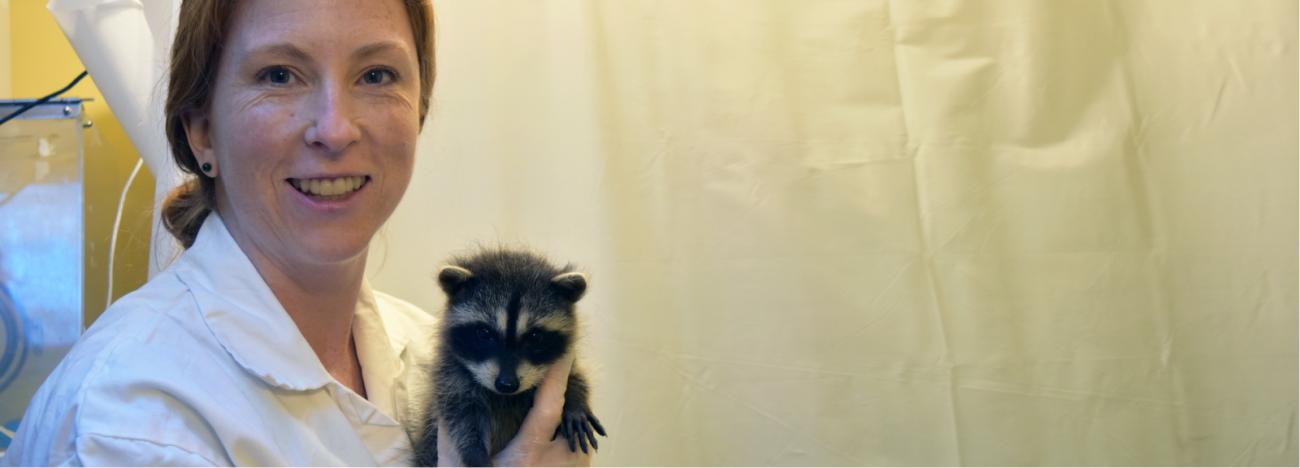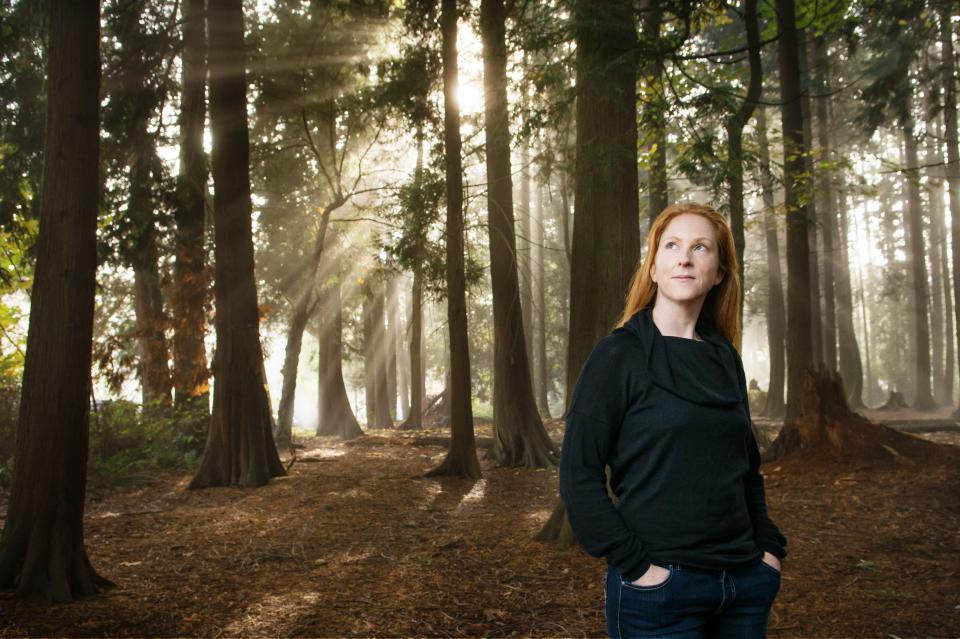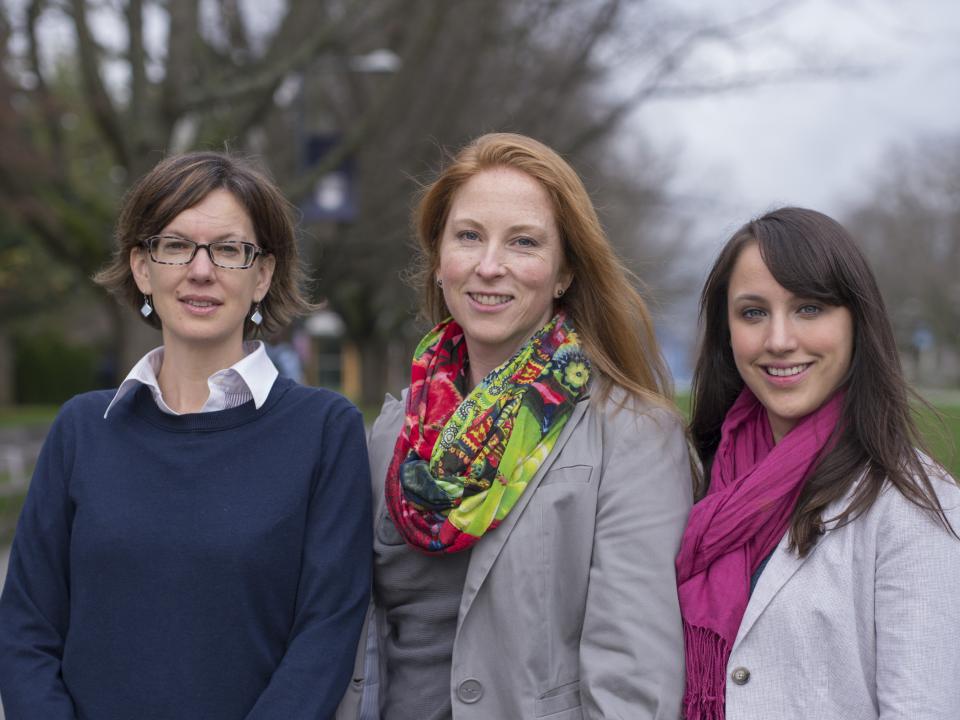Call of the Wild
Late one September night, Sara Dubois took an urgent call at the BC SPCA’s Wild Animal Rehabilitation Centre (Wild ARC): “I’ve got a raccoon in a trap, right now, and she’s acting very strange. Can I bring her in to you?” said the man on the end of the line. It was unusual for a pest control operator to be concerned enough to call the SPCA over a run-of-the-mill catch and release job, and Dubois needed to get to the bottom of it. Perhaps the animal was injured while being trapped, or maybe something more insidious was at play. “Yeah, let’s get her in here.”
The man arrived within the hour, raccoon in tow. “Is it possible that she’s got babies?” he asked. It had been a late summer and this wasn’t outside the realm of possibility. Ordinarily, the trapper would finish his job by transporting the animal outside of town and releasing it into the wild, but without their mother any kits would likely starve to death, and Dubois was determined to not let this happen. The two came to an agreement: if she could prove that the raccoon was nursing, the trapper would release his quarry where she was caught. But how do you prove an animal is nursing? In mammals, the answer is simple: you milk it.
Milking a raccoon is no simple matter, however, especially one who’s not happy about being trapped and transported. “She is strong,” recalls Dubois, “she is mad as hell, and she wants to bite your hand off.” But several harrowing minutes later, Dubois and her colleagues were able to confirm the raccoon was nursing, and, true to his word, the pest control operator returned mom to her babies.
It was this encounter that set off the next decade of Dubois’ work. Wild ARC regularly sees the results of poor pest control practices, but this was the first time she had met an operator who was willing to do the right thing for the animals they've trapped. “Perhaps there could be more people like him who would change their practices if they knew more and had other incentives to not relocate or kill wildlife," thought Dubois. "We [could] have a significant impact on wild animals’ lives. And not just a few, we’re talking millions, and millions, and millions.”
Pest control may be a trivial matter for many – an out-of-sight, out-of-mind necessity in an increasingly crowded world. But Dubois – now the BC SPCA’s Chief Scientific Officer and an adjunct professor at UBC’s Faculty of Land and Food Systems – argues that improving the ethical standards by which the pest control industry operates will lead to a more harmonious relationship between humans and animals in the places we share. “Wild animal welfare goes under the radar,” she says, “because people assume [any injury or untimely death is part of] a natural process. But the reality is most of these animals are dying because of human intervention: Cars. Netting. Windows…. We disturb their habitats. We trap them, we kill them, we relocate them when we shouldn’t.”
Milking a raccoon is no simple matter.
Dubois’ passion for animal welfare can be traced back to her childhood in the countryside outside Victoria. Immersed in nature, she forged deep connections with the myriad living things around her, and went on to study animal biology at the University of Victoria. In a stroke of luck, she was invited to help a veterinarian with a project at the then-new Wild ARC, and it proved an eye-opening experience for the young biologist. “I had no idea that this even existed - that there was a hospital for wildlife.” It was while she was taking part in a vaccination program for raccoons that Dubois’ mind was made up. “This is it,” she thought. “I want to help individual wild animals, not just put a species label on them and say ‘let’s conserve.’”
She started with promising co-op student jobs as wildlife biologist with BC’s Ministry of Environment and several NGOs, but her growing interest in improving the welfare of wildlife ultimately led Dubois to her master’s studies in the Animal Welfare Program at UBC’s Faculty of Land and Food Systems (LFS). “It was still very early on in the program and they hadn’t really had wildlife students before,” she recalls, “so I had to really sell it to them.” Dubois went as far as preparing an outline of her research methods and hypotheses, along with an overview of her thesis - right down to the chapter titles. She got in.
Her aim was to study the goals, impediments, and attitudes of wildlife rehabilitators in BC, who were generous in providing access to data and open to discussion about how to professionalize rehabilitation practices.
Dubois returned to Wild ARC as its manager in 2004. “It was kind of like going home,” she says. “Coming back after my master’s degree to manage that facility was everything I could have dreamed of.” Not one to rest on her laurels, however, she began considering how organizations like the SPCA could support wildlife through better governmental policies and legislation. She returned to Vancouver in 2008 to take a role as manager of Wildlife Services at the provincial SPCA office and two years later began her PhD at UBC.
This lack of oversight in ethical standards is the reason that, despite frequent inquiries from the public, the SPCA is largely unable to recommend specific pest control operators. “Without auditing those companies,” says Dubois, “without being on the ground and actually verifying their practices, we can’t give out referrals.” That, she says, was one of the motivators for the ultimate goal of her project: the development of an accreditation program for pest control operators, the first of its kind in the world.
Subsequent funding from the Wall Centre and the Vancouver Foundation means that AnimalKind will be able to launch its pilot phase later this year. Developed with the assistance of Erin Ryan and fellow LFS alumna Nicole Fenwick, MSc’05, who was hired as the BC SPCA's manager of Research & Standards in 2016, the program translates the principles established at the Compassionate Conservation conference into testable metrics. It has recently received certification from the US-based Professional Animal Auditor Certification Organization, which oversees other animal welfare accreditation programs.
Dubois hopes that the accreditation program will incentivize pest control companies to adopt ethical practices as a means of gaining advantage in business, and, so far, the industry has been remarkably receptive.
Looking forward, she hopes to roll out a public education program to help people implement ethical control practices in their own homes and businesses. She gives the example of glue traps: “Homeowners can go to any hardware store and buy glue traps, which is infuriating because we know that glue traps were never meant to kill animals. They were meant to physically contain the animal and then you have to use another method to kill them. But homeowners are not going to step on an animal’s head and kill it, they’re just going to allow that animal to die of starvation or dehydration on that glue board.” Ultimately, she wants to ingrain a culture of coexistence and encourage the public to adopt simple strategies to accommodate wildlife and avoid unnecessary suffering.
“I think of recycling as the paradigm to follow,” she says, “there’s a social effect of ‘everybody recycles, why don’t you?’ It’s the same kind of thing -- ‘everybody uses exclusion and prevention methods, why are you killing animals?’”


































